The war against Mithridates
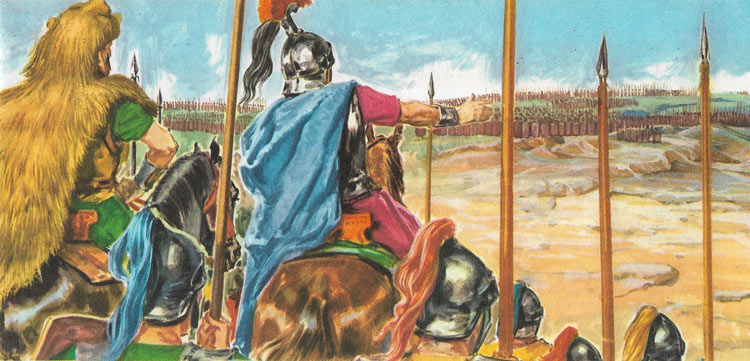
On the plain of Chaeronea the army of Mithridates is faced by the army of Sulla. The Romans, who occupy Mount Thusium, are in a strategically superior position.
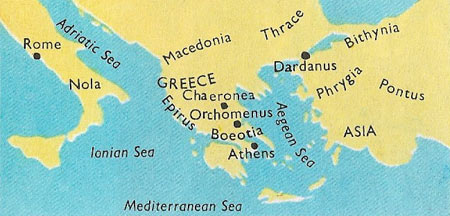
The geography of the Mithridratic wars.
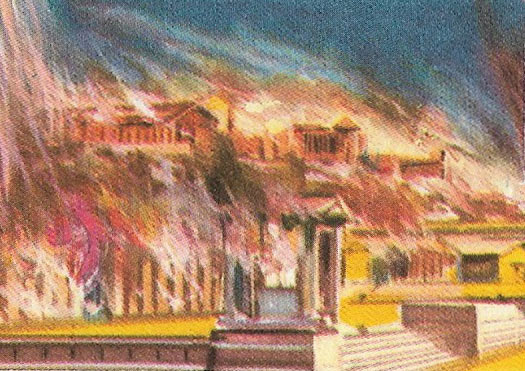
Athens burnt by the soldiers of Sulla.
One morning in 88 BC the Roman Senate met in the temple of Bellona for a debate. During the discussion an incident took place which made a lasting impression on the minds of all those present. A sparrow flew into the hall, holding a grasshopper in its beak; the sparrow dropped part of the grasshopper and then flew away, still holding the rest.
At that time a supernatural meaning was given to all unusual events, so the augurs were summoned in order that they might explain the meaning of what happened. They declared that this was a warning to the Romans that serious disturbances were about to take place in their city; it was not long before the prophecy was fulfilled.
The civil war
Alarming news had lately reached Rome: Mithridates VI, the King of Pontus, had invaded Bithynia, Phrygia, and the Roman province of Asia: furthermore, he had organized the massacre of the inhabitants of the Roman province, together with their families; the victims numbered some 80,000. The whole of Greece, which had been subject to Rome for half a century, was overjoyed, and united together under Mithridates. The Greeks thought that at last the moment had come to throw off the Roman yoke.
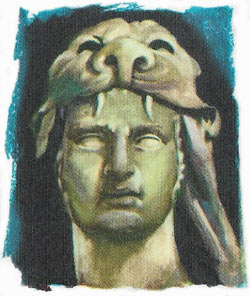 |
| Marble head of Mithridates (Paris: the Louvre). |
What remedy could the Romans find for this great disaster? There were two leading generals in Rome: Marius, the head of the popular party, and Sulla, the head of the nobles. To whom should the command of the expedition against Mithridates be entrusted? To Marius or to Sulla?
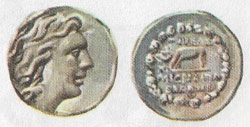 |
| The two sides of a silver coin of Mithridates. |
The war with Mithridates aroused great rivalry between the generals, on account of the enormous wealth of the King of Pontus, which would go to the victorious general. At first it was decided that the command of the Mithridatic was should be given to Sulla, who was one of the consuls for that year. The aged Marius refused to accept this decision, and his supporter, the tribune Sulpicius, organized riots in Rome against the supporters of Sulla. Sulla unexpectedly left Rome and rejoined his army, which was mustering in Nola. Sulpicius now had the war entrusted to Marius; immediately envoys were sent to Nola to take over the command of the army which Sulla collected. But Sulla's army had no intention of submitting itself to Marius, and when the envoy arrived from Rome they were stoned. Upon this Sulla marched on Rome at the head of an army of 35,000 men. This was an hour of disorder and terror for the city, as Sulla's Romans fought the Romans of Marius.
Marius' badly armed soldiers defied the Sullans, pelting them with stones and tiles, but they were soon defeated. Sulla now turned to the war with Mithridates.
The destruction of Athens
Meanwhile Mithridates had extended his conquests, and his army had advanced as far as Thrace and Macedonia. But when in 87 BC the troops of Sulla disembarked in Epirus on their way to fight Mithridates, Greece, which had been the ally of Mithridates, went over to the Roman side. Only Athens, under the command of its tyrant Aristion, resisted Sulla.
The Roman general immediately prepared a plan for attacking the city. He employed at least 2,000 mules for the transport of engines of war, and he down the holy trees of the woods to obtain the timber needed to build the army's wagons. Eager for money, Sulla ordered that the temples should be pillaged and robbed; the temples of Olympius and Delphi, famous and respected throughout the pagan world, were stripped of all the wealth which they possessed. Early in 86 BC Sulla's troops marched upon Athens, made a breach in the walls, and entered the city. At midnight Athens was aroused by the noise of a thousand trumpets; the inhabitants tried to defend their city, but they could not hope to hold out against the overwhelming strength of the invader. The massacre which Sulla carried our remained legendary. It is said that the blood of the slaughtered inhabitants flooded one whole quarter of the city. As soon as he had conquered Athens and captured its tyrant, Sulla moved north to attack Mithridates.
The battle of Chaeronea
The armies of Rome and Mithridates faced each other on the plain of Chaeronea. Sulla's army consisted of only 1,500 cavalry and 15,000 infantry. Mithridates had three times as many men; he also had scythe-chariots. His forces made a magnificent and impressive spectacle: vast regiments of soldiers with shining arms and breastplates, billowing cloaks, and brightly colored flags.
The Romans had a difficult battle before them, but at the very outset Sulla succeeded in occupying Mount Thusium, the most commanding position on the plain. This had its risks, for Sulla suddenly found himself crushed both on his right and left sides, as though in the grip of a vice. Quickly he made off to the right, where he gained a victory; then doubling back to the left, he finally broke the enemy.
Although there had been moments when the Greeks appeared to be winning, in the end the Roman army succeeded in defeating the army of Mithridates. The enemy losses were enormous – at least 10,000 men; in his memoirs Sulla claimed that only 14 of his whole army were missing, and he added that two of these returned to the camp in the evening.
Mithridates did not resign himself to defeat, and in 85 BC he invaded the Greek district of Boeotia. The Romans and Mithridates now faced each other on the open plain of Orchomenus, 10 miles from Chaeronea. The beginning of the battle was unfavorable for the Romans, and Sulla's soldiers began to waver. However, Sulla finally managed to restore order and then succeeded in checking the enemy's charge. The Roman army turned on and slaughtered the Greeks. The blood of Greek soldiers dyed the nearby marsh red, and 200 years after the battle fragments of their arms and breastplates could still be found in the mud.
After this defeat Mithridates was forced to beg for peace. Sulla and Mithridates met at Dardanus and arranged terms; in an attempt to impress the Roman commander Mithridates arrived with an enormous following of 20,000 infantry and 6,000 cavalry. But the Roman general was, after all, the conqueror, and Mithridates was obliged to surrender 2,000 talents and 70 ships, and agree to leave all the countries he had occupied.
The return to Rome
Sulla returned to Italy in 83 BC. Here he found that during his absence in Greece the Marian party had succeeded in gaining power. Sulla did not lose heart; he eventually defeated his rivals, and made himself dictator of Rome.
Mithridates – King of Pontus
Mithridates is also famous for various strange events which marked his life. In his childhood Mithridates' life was threatened by his tutors who wished to gain possession of his immense riches. They did everything they could to kill him, and in particular made him perform dangerous exercises, such as riding on an unbroken horse and at the same time hurling javelins. However, thanks to his skill, Mithridates always succeeded in thwarting their schemes. His tutors then attempted to poison him; but Mithridates, who had foreseen this threat, had trained his body to endure poison by giving himself small doses of it and then gradually increasing the amount. Soon he reached the stage where poison could no longer affect him. When they realized that even poison could not harm Mithridates, his enemies attempted to kill him by preparing an ambush. When Mithridates discovered that his tutors were planning this new attack, he decided to escape it by devoting his life to hunting. He left his kingdom and roamed the forest and mountains, and took refuge in caves. For seven years he never slept in a fixed place. This way of living saved him from constant attacks of his enemies and made him strong and tough.
